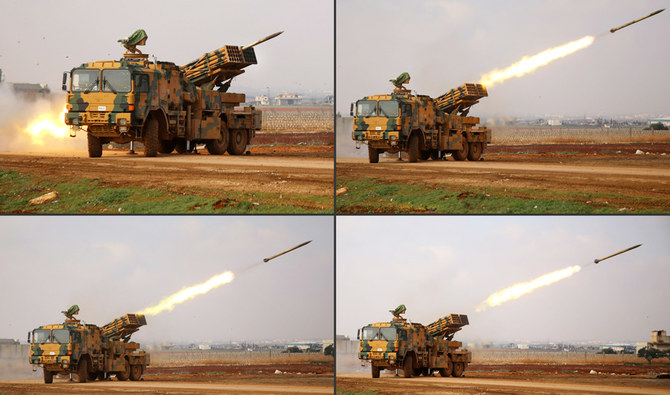ANKARA: Turkey on Saturday hit back at Russian accusations of failing to honor a 2018 deal by insisting it carried out its responsibilities in Idlib, Syria’s last major opposition bastion. “Observation posts were set up and the regime had to stay outside of this area. Russia and Iran were to ensure the regime stayed outside, Turkey had responsibilities too, Turkey fulfilled these,” Turkish Vice President Fuat Oktay told NTV broadcaster.
“Undertaking an extremely risky and difficult duty, Turkey took real initiative to stop the bloodshed of civilians, to prevent a new migration wave and to ensure it did not become a terror nest.”
Turkish President Recep Tayyip Erdogan said the situation in Idlib will not be resolved until Syrian regime forces withdraw beyond the borders that Turkey and Russia outlined in a 2018 agreement. Otherwise, he warned, Ankara will “take matters into its own hands.”
Russian Foreign Minister Sergei Lavrov, however, said the victory over terrorists is “unavoidable” in Idlib. He called the area “one of the last hotbeds of terrorism” in war-ravaged Syria.
Erdogan discussed with US counterpart Donald Trump ways to end the crisis and condemned attacks by President Bashar Assad’s forces there.
“Stressing that the regime’s most recent attacks are unacceptable, the president and Trump exchanged views on ways to end the crisis in Idlib without further delay,” the presidency said after the two leaders spoke on the phone.
Russia’s Foreign Ministry meanwhile has intensified its criticism against Devlet Bahceli, the leader of a Turkish party allied to the ruling Justice and Development Party (AKP), who said that Russia did not have good intentions in Syria because it was playing both sides.
Syrian regime as their target instead of Russia, according to an expert.
“We won’t be reassured until the killer (President Bashar) Assad goes away,” Bahceli said during a parliamentary meeting.
FASTFACT
Turkish authorities had in the last few days opted for a milder tone regarding their messaging on Idlib, positioning the Syrian regime as their target instead of Russia, according to an expert.
“Assad is a killer and the source of enmity. Russia, which tries to handle Turkey and Syria at the same time, does not have good intentions. It’s our sincere wish for the government to revise its relations with Russia.”
Moscow called on Turkey to refrain from making provocative statements on Idlib that undermined the “constructive dialogue between the two countries.”
Sezer said that the Kremlin had criticized Bahceli because any statement coming from him was seen as coming from the Turkish government.
The Russian-backed Syrian military offensive had achieved its core aim of securing the M5 highway between Damascus and Aleppo, according to independent Syria analyst Danny Makki, and he said it was possible there would be an advance into Idlib city, the provincial capital held by the opposition since 2015, to try and break Idlib into two.
“However, this all rests on the level of Turkish resistance they will face,” Makki told Arab News. “So far, any genuine Turkish military confrontation will come at a high loss of the Syrian army, and despite the fact that it has numerous Turkish observation posts surrounded, Turkey can still stall the Idlib offensive if it chooses to.”
Assassination threats
Meanwhile, Turkey has increased security around Russia’s embassy after its ambassador said he had received death threats.
Russia’s Ambassador to Turkey, Alexei Yerkhov, told Sputnik Turkey that he had been verbally threatened amid nosediving bilateral relations.
He said that the messages told him to “say goodbye to life” and that it was time for him to “burn.”
His predecessor Andrei Karlov was assassinated in Ankara by an off-duty policeman during the opening of an exhibition.
Kremlin spokesman Dmitry Peskov said Moscow expected Ankara to ensure the safety of all Russians, as well as embassy staff, living in Turkey. But members of Russia’s State Duma had tougher words.
“Is that such a Turkish diplomatic tradition?” State Duma Deputy Alexei Zhuravlev wrote on Facebook. “The Russian Foreign Ministry needs to demand from Ankara the security of our ambassador and the entire Russian diplomatic corps in this country.
In the absence of mutual understanding, diplomatic relations can be frozen. The life of our people is more dear!”
Aydin Sezer, an Ankara-based analyst on Turkey-Russia relations, said that Idlib and diplomatic missions may turn into a critical target for those wishing to sabotage ties between the two countries.
“I think that such threats, if they are real, could come from specific segments, like jihadists groups and some intelligence groups,” he told Arab News. “If they succeed ... it would create significant outcomes regarding Turkey’s diplomatic representations.”
He added that Turkish authorities had in the last few days opted for a milder tone regarding their messaging on Idlib, positioning the Syrian regime as their target instead of Russia.




























